
Această recenzie poate conține spoilere
Even if you start at a disadvantage, you can still be first across the finish line
Zero to Hero is an inspiring biopic about twelve-time Paralympic medalist So Wa Wai. So was the first para-athlete from Hong Kong to win gold and still holds the record in the 200m sprint. Zero to Hero is a feel good movie that also doesn't shy away from it's characters' faults and harsh reality.So Wa Wai was born with haemolytic jaundice which resulted in cerebral palsy. His mother was told he would never walk or be able to hold chopsticks. And he would only be able to hear 10-20%. She carried him on her back, literally, until he was four. In a desperate life or death moment, the mother challenged him to walk. As he gained more ability, they learned he may not walk well, but he could run.
As a teenager he joined the para-athlete's association and trained to run in competitions. The way to his success did not always run smoothly. His family was poor and used desperately needed funds to help him achieve his success. The movie highlighted how difficult it was for Paralympic athletes to continue training and competing with few subsidies from the government.
The true heart of this movie was the mother-son relationship. Sandra Ng gave a beautiful performance as the resolute mother who refused to give up on her child and sacrificed greatly to ensure he became all he could be and that he would have a financially secure future after she was gone. This created conflict with Wa Wai as he worried she was using him at one point and with his younger brother who felt at times that his only role was to be Wa Wai's future caretaker. Though perhaps flawed, the strength of this mother's love and determination to gain the best for her son and for him to overcome his limitations shined through. "Run to me at the finish line."
Leung Chung Hang's performance never felt patronizing. He poignantly portrayed a child dependent on his mother who grew into a man with his own goals and need to help his family. Yet in the end, it was the love for his dedicated mother that gave him the strength to attain those goals.
Heartwarming and inspirational with enough realistic edge to keep it from being treacly, Zero to Hero is a winner.
Considerați utilă această recenzie?

Nothing goes to waist in this short film!
I started this short film trepidatiously due to the title---My Wife Got Fat. Too often fat shaming is condoned and can be cruel and demoralizing. Thankfully, there was no judging or taunting here.When a wife wakes up to find she’s gained 2.2 kg/ 5 lbs she becomes frustrated that she’s gotten “fat.” Her husband doesn’t say much but begins to observe her. What he discovers touches him and he makes a plan.
Jang Young Nam played the anxious and loving wife and mother. It was hard for me to think of this slender woman as “fat.” I kept hoping her husband and sons would tell her how beautiful she was and to not be discouraged. Kim Tae Hoon brought a tenderness and understanding to the husband. Kim Joon as the youngest son is one of the most adorable child actors around. Fortunately, Ahn Ji Ho’s teenager wasn’t awful like so many teens are shown as being and was also enlisted to help the mom out. Throw in a cute dog and this family was about as perfect as they get. The resolution made the husband even more endearing.
With all of the dysfunctional families in Kdramas it was a joy to see a loving, supportive family. Though not even in my dreams could I aspire to be as “fat” as this thin mother. The mom was beautiful, active, and cared for her family and never should have felt less than. Apparently, not only beauty, but fat is in the eyes of the beholder. Thankfully, the beholder in this film saw his wife through the eyes of love.
21 November 2024
Considerați utilă această recenzie?
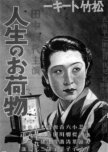
"Women are like products for sale"
Burden of Life was a short Gosho Heinosuke film from 1935. Not going to sugar coat this one. I hated it. Even taking into account the time period, it was so overtly sexist that it made my blood boil.There might be a couple of elements below that could be considered spoilery:
The film starts out safely enough (sort of) with a playful bantering of the sexes. Itsuko is the middle sister married to an artist who paints semi-nude portraits of her. They live beyond their means and rely on her parents helping them out with money. Oldest daughter Takako is married to Tetsuo and are always fighting. He disapproves of her buying anything for herself, yet he spends his time in hostess bars drinking and buying drinks for the hostesses. Machiko, the youngest daughter, is about to be married which is costing her dad more money. Nine-year-old Kanichi is the baby of the family. He stays away from his dad as much as possible, even eating dinner in the kitchen to avoid him. Shozo has nothing good to say about the boy. His mantra is, “We never should have had him.” Finally, the mother has had enough and begs the father to be kinder to him and plan for the son’s future as well.
I’ve watched numerous older films, but the gaslighting of the mom to prove that the father knew best and women were overly emotional was too much for me. There appeared to be a tiny softening of Shozo near the end but it was not nearly enough for me to accept any real character growth. I found the father’s attitude deeply disturbing. Shozo didn’t know Kanichi’s age and had no plans for the boy to be educated. He considered the boy too short and too ugly to ever be married. Surprisingly, this was one of the first times I’ve come across a father wanting to be rid of a son. Daughters were often lambasted as being useless, but sons always seemed to be coveted. Shozo’s domineering attitude toward his wife had me hoping she’d smother him with her pillow while he slept. He kept saying he wished Kanichi had never been born, being as brilliant as he was, surely he knew how babies were made, didn’t he?
Despite the age of the film and knowing attitudes have changed in the last nearly 100 years, I could not enjoy this film at all. Other early directors had a modicum of respect for their female characters and audience. A child being continually rejected by his father destroyed any enjoyment I might have had with this film otherwise. If you are a fan of Gosho or can tolerate bad parenting and dismissive attitudes for women, at 67 minutes it’s worth a try. I gave myself a day to think about it and try to rationalize the father/husband’s behaviors and the neighbors’ but am still mad. Given this was supposed to be a lighthearted slice of life, I don’t think that’s the response Gosho was trying to elicit.
17 November 2024
Considerați utilă această recenzie?
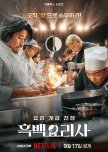
"Are they Squid Gaming us?"
Culinary Class Wars managed to highlight the Korean culinary world’s hierarchy without being mean spirited even with layers of ambition and main courses of egos served piled high. Chefs and judges Baek Jong Won and Anh Sung Jae were the ring masters who declared who stayed and who went home in this high stakes cooking competition.Eighty chefs, many self-taught or working as street vendors or in average restaurants came to take on 20 professional fine dining chefs for a prize worth 3 million won/215,000 (USD). The chefs on the lower rung of the hierarchy were titled Black Spoons and only given nicknames. The professional chefs were given the title of White Spoons and their real names were used. Only 20 Black Spoons would move on to the next level after the first challenge. After the winnowing, Black Spoons went head-to-head against the White Spoons in ever demanding challenges.
My favorite challenge was the Blindfolded Challenge. I’ve seen too many cooking shows where the established chef is treated deferentially and preferentially. The Pros freaked out when their advantage diminished. With only their senses and not their sight, Baek and Anh had to determine which dish tasted best. For this alone, I gave the show a .5 bump. The Infinite Cooking Hell mission would be my second favorite as the chefs had to utilize the blandest ingredient I can think of in numerous dishes. Honestly, I would have preferred for this to have been the semi-final with ALL of the remaining chefs participating to see what they were truly made of. The final by comparison was a limp noodle and anti-climactic. At least have them make a three-course meal to demonstrate a range of skills.
If I have any other quibbles, it would be with the editing. The class wars took place there as well. The Black Spoons also had a hierarchy. Two of the female contestants I was invested in, had much shorter screen time than most of the male BSs. It wasn’t difficult to determine who would be the finalists due to the editing as some chefs were barely shown.* There were also a couple of conflict of interests, including using Baek’s products in one challenge. The Professional Chinese chef’s protégé was given several second chances which wasn’t a good look. The maneuvering to keep some contestants and the ratio of White Spoons vs Black Spoons even was over obvious. Also, thirty minutes to do the introductions in the first episode was overkill. I’d rather watch them cook.
The culinary social statuses were clearly delineated. Early on the White Spoons may have admired some of the cooking techniques they observed by the Black Spoons, but often acted superior as if their skills were untouchable. After all, many of them were award winning, well established, famous, and far removed from prepping the highest quality ingredients for the meals served in their restaurants. The Black Spoons were mostly chefs fighting for recognition and validation, true hustlers innovating with the ingredients available to them. I will nearly always root for the underdog, and cheered each time a BS took down a WS, even more so when the WS had a shocked look as they tried to process losing. My heart broke for one Black Spoon who beat a White Spoon and was so overcome he pulled a peasant in a Sageuk and kneeled head to the floor in respect and was never acknowledged by the old dude.
The White Spoons had only their egos on the line. At first, they didn’t seem too worried about the rookies. As the WSs began to hit the floor it became obvious the BSs had nothing to lose and were playing for keeps. They weren’t just fighting for prize money, they were fighting for recognition and to show they were worthy of respect. The biggest exception I had to the White Spoons was Edward Lee. He embodied not only a competitive spirit but also a humility unusual for someone skilled in discovering unique and clever flavors and presentations. I’m still a little salty that one of his dishes was significantly downgraded over his name for the dish and not the flavor. Now that is culinary elitism at its best.
Many of the Black Spoons knew their chances of winning were slim, but they still persevered to prove themselves to others and to themselves. Despite working in what would appear to be basic places with whatever ingredients they could afford, they took pride in their food and desired recognition. Often judged for their lack of fine dining skills, they still prepared delicious food. I’m okay with the winner though the result felt too scripted, a common drawback in most cooking competitions. I was just relieved they didn’t turn it into a Game of Thrones or Squid Games to make the show more dramatic. Watching chefs work to create delicious and memorable dishes was thrilling and entertaining enough.
"Once you start walking you have to go all the way through to the end." Edward Lee
16 November 2024
*
*
*
*
*
*
*
*
#JusticeforTheLunchLady! I hated that her head-to-head competition with a White Spoon was barely shown. This was the biggest upset of that challenge for me! She survived several rounds and had very little screen time. She and Hanbok Auntie punched above their weight throughout the competition.
I did love the Italian chef's response when he lost, "Fabri always stays positive" while holding up finger hearts. And classy! I knew he was screwed when their ingredient to work with was skate.
While her attitude could sometimes grate, I had to admire Jung Ji Seon for her tenacity to become a famous chef in a profession often ruled by men.
Considerați utilă această recenzie?
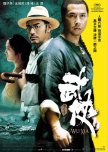
Homage to Jimmy Wang Yu's One-Armed Swordsman
Wu Xia aka Dragon was a nice homage to The One-Armed Swordsman, even casting Jimmy Wang Yu as the Big Bad. My review is based on the shorter international version which was thankfully subbed and not dubbed but was still almost 20 minutes shorter than the original version.Liu Ji Xi makes a living making paper and lives with his wife, stepson, and young son. Their lives are quiet and idyllic until one day two notorious criminals who have escaped custody break into a shop and brutalize the older couple who own it. Ji Xi clumsily stumbles in and intervenes. Afterward when the village is celebrating Ji Xi’s heroic acts, Detective Xu Bai Ju arrives. He believes that there may have been more than luck involved when the simple papermaker defeated too skilled killers. His suspicions are confirmed when the 72 Demons Gang attacks the town in search of Ji Xi.
Donnie Yen played the papermaker with a mysterious past giving the kind of performance you’d expect from him. He also choreographed the fights which meant they were entertaining to watch. Tang Wei played his wife, Ah Yu. Sadly, she didn’t have much to do in this film. Ji Xi’s bespectacled antagonist was the investigator played by Kaneshiro Takeshi who had his own murky past. I suspect some of the edits came at the cost of Kaneshiro’s character as there was more to him hinted at than what I saw. I would like to think Tang Wei’s time was also cut because in the 97-minute version she was criminally underused. Jimmy Wang Yu played the nefarious Master of the 72 Demons gang who was a formidable martial artist. I was never a fan of Jimmy’s old kung fu flicks, even blasphemously the original One-Armed Swordsman. To my relief, he gave a more nuanced, if menacing, performance here. Kara Hui (My Young Auntie!!) bounded in as one of the Demons and at 51 years of age held her own with Donnie in their choreographed fights.
Dragon had superb fights, two male leads with painful pasts trying to make the best of their lives, and a thriller element when the 72 Demons came to town with swords drawn. The film called into question whether there was room for empathy in enforcing the law. Dragon might not have broken any new ground, but it was stylishly filmed and well-acted. Not a bad way to spend an hour and a half.
7 November 2024
Trigger warnings: Body parts went flying in three different scenes as well as a tooth
Considerați utilă această recenzie?
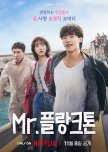
"There's no way you can be lost if you don't set a destination"
Mr. Plankton told the story of three wounded people finding love and reconciliation down a messy, uneven path. Woo Do Hwan can make any role compelling and he had some heavy lifting to do in the early episodes of this drama, thankfully he’d been working out.Hae Jo and Gi Ho run a boys for hire service, picking whatever jobs Hae Jo thinks will be fun. Hae Jo was emotionally abandoned as a child due to a mistake at an IVF facility and seems to have no love to give. The entrepreneurs take on a job of “kidnapping” a bride which goes south really quick and ends with Hae Jo discovering he has three months to live. He decides to search for his biological father to try and make some sense of his life and in the process kidnaps another bride for real. Soon he has the first bride’s villainous gangster groom after him as well as the second bride’s loving groom.
The first few episodes were difficult for me because I had real concerns about the lack of consent on Jae Mi’s part when Hae Jo kidnapped her. Despite having a past, it came across as problematic. Of course, eventually their shared loved and Woo Do Hwan’s gorgeous face and body convinced her to help him on his parental quest, but that doesn’t negate the kidnapping. Jae Mi’s fiancé, Heung, became hopelessly entangled in their lives. I actually liked Heung. While he had mommy issues due to an overbearing mother, he was a good man who genuinely loved Jae Mi and didn’t deserve to have a front row seat to Hae Jo and Jae Mi’s burgeoning love story. Gi Ho, who became embroiled with the gangsters searching for Hae Jo suffered greatly for his loyalty and friendship which went all but unacknowledged.
Now that I’ve stated the things that didn’t work for me, here’s what did. I’m a sucker for reconciliation stories and found families. Once everyone was mutually onboard the crazy train without a destination, the story worked better. Hae Jo discovered that his family was not the only one with problems. Heung began to develop enough confidence to defy his overbearing mother. Jae Mi came to understand that she had worth. And all three would have their eyes opened to the love all around them.
Woo Do Hwan’s performance was mesmerizing even when Hae Jo behaved liked a self-centered jerk. He has a way of making any character sympathetic and did the same here which was a momentous task as Hae Jo spent much of his time hurting others. Oh Jung Se had the difficult job of making a middle-aged man who could not stand up to his mother likeable. Heung was such a compassionate character that he could set aside his own feelings and respect Jae Mi’s choices. The character that downgraded this drama for me was Jae Mi. I found the writing for her and the acting grating. Jae Mi spent much of her time yelling or acting childlike which caused me to hit the mute button numerous times per episode. All three characters were complicated and flawed, having been wounded by their parents. All three were on a journey towards love, growth, and forgiveness. Though much of the growth was understandable, there was some that felt unearned.
Mr. Plankton was an uneven drama with moments of humor, sorrow, and love driven by Woo Do Hwan’s compelling performance. The specter of Death lingered in the shadows from beginning to end. Hae Jo’s vision of what was important cleared as his final days approached. Family isn’t always what we’re born into, sometimes it’s what we make it.
“Never set a destination. Just let your instincts take the lead for you. That way you’ll never lose your path.”
11 November 2024
Considerați utilă această recenzie?
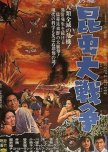
Revenge of the insects!
Genocide was a dark film with a very bleak opinion of humanity. Director Nihonmatsu Kazui threw a lifetime of grievances against the screen to see what would stick-nuclear war, environmental concerns, concentration camps, PTSD, racism (whether intentional or not), sexism (whether intentional or not), murderous insects that could communicate, and the Cold War. That was a lot to tackle in 86 minutes.Joji collects insects on an uninhabited island with Annabelle both for her own study and for his friend, Dr. Nagumo in Tokyo. When Joji and Annabelle are “relaxing” they see a plane catch fire with four parachutes dropping out. Later, two American crew members are found dead and one unconscious. Because Joji tried to sell a watch he found that belonged to a crew member he is arrested for murder. Colonel Gordon wants him to pay for their deaths but he is far more concerned about a missing nuclear bomb. Soviet spies are scouring the islands attempting to find it as well. To complicate matters, killer bees are on the loose bent on destroying humanity. Joji, his wife Yukari, and Dr. Nagumo become hopelessly entangled with a vengeful scientist, predatory insects, and two super powers.
There really was a lot to unpack with this film. Charlie, the black crew member, suffered casual and overt racism from just about everybody. He’d suffered severe PTSD from the war and had become addicted to drugs which caused everyone to treat him even worse. Yukari was sexually assaulted twice and the female doctor once with very little afterthought. The vengeful scientist was a survivor of the notorious Auschwitz concentration camp and had it in for humanity. “I love insects because they never lie.” The American colonel seemed to be a rogue commander willing to start a nuclear war and kill thousands of people to cover up his mistake. The Russians were using the deadly bee research for biological weapons and desperately wanted to get their hands on the bomb. As people showed their ruthlessness and/or utter stupidity on a regular basis, I began to root for the bees.
The actors performed well, something of a rarity for cheap horror flicks. There were several non-Japanese actors who were dubbed in Japanese. I don’t know who wrangled the bee actors but I hope they were paid handsomely. My biggest complaint was in the editing. There were times that people disappeared and ended up somewhere else without explanation. If you have a problem with insects, this film has numerous buggy scenes. I had to turn my head when bodies were infested with creepy crawlies or being chewed on. The science and logic for the film was genuinely lacking. It stretched credulity when a USAF officer believed that detonating a nuclear bomb was a smaller offense than going to the trouble to retrieve it. It's not like someone could have stuffed a multi-ton bomb into a backpack and carried it off the wooded island. Despite gruesome infested wounds, no one would believe the scientists that the insects had turned against humans. Un-bee-lievable.
Genocide was unflinching in its nihilistic view of the world and humans’ place in it right to the bitter end. Nihonmatsu took a stand and didn’t deviate from it. The insects let people know, “The Earth doesn’t belong to humans alone. We don’t care if mankind destroys itself with nuclear weapons, but we refuse to let you take us with you!”
29 October 2024
Trigger warning: Numerous insect scenes in a variety of manner and stages
(Rated on a curve for old, low budget, niche films)
Considerați utilă această recenzie?
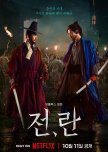
"You think you can attain real power through ideas alone?"
Uprising explored the plight of slaves and peasants around 1589 during a tumultuous time in Joseon history. It was also action packed with revolts and a Japanese invasion. All while the king waxed on about the insignificance of his tax and work base.Cheon Yeong has been a slave due to a legal and moral loophole ever since he was a child. He has reluctantly served the underachieving young master, Yi Jong Ryeo. Through the years they became fast friends until a broken promise and a misunderstanding set them on divergent paths as the Japanese began marching across the country.
The first thing I had to do was age the two main characters upward. When a flashback was labeled “Twelve years ago,” all I could think was that the two young boys did not look 30 years old. This trope of brothers or sworn brothers turned mortal enemies due to a misunderstanding has been done many times before. Poor Cheon didn’t even know there was a problem for seven years. He had his hands full fighting the Japanese with a ragtag assortment of peasants and slaves abandoned by the nobility. Yi served the king who had fled during the crisis. No one really cared what happened to the little people who were often killed or left homeless. Even when the king learned of the small band’s heroic results, he was more interested in how he was going to get a strong enough workforce and money to build a more splendid palace. Apparently, nobility had nothing to do with nobleness and keeping one’s word or administering true justice.
While the story was nothing new, the fights were well choreographed and gruesomely realistic. Swords are sharp and used with great force which meant body parts tended to go flying. Cheon was very disarming with a sword. Though it was the corrupt officials who caused righteous people to lose their heads. The director might have taken a little too much delight in mangled bodies. Kang Dong Won gave a strong performance as the dangerous and shrewd slave, though Cheon naively believed the duplicitous nobility too many times. I didn’t find Yi Jong Ryeo a very sympathetic or interesting character nor very nuanced. I enjoyed Kim Shin Rok’s Beom Dong who had a better insight into the ways of the nobility and a lot of moxie. She also wielded a mean staff.
Uprising kept a good pace throughout though it ran a bit long for me. The historical backdrop was far too complex to wedge into 120 minutes which made it feel like the story fast-forwarded over numerous subplots. The tragic showdown between Cheon and Yi was inevitable but a letdown. Honestly, I was more invested in the confrontations between Cheon “The Blue Robed God” and the “Nose Snatcher” Japanese commander Genshin Kikkawa. The animosity and fighting respect between the two warriors was compelling and thrilling. Going into the movie and knowing slavery continued for 300 more years after the events portrayed here only led to the feeling of pathos for many of the lives sacrificed. Despite some of my reservations, Uprising was an entertaining film and worth trying if you enjoy this genre.
22 October 2024
Trigger warnings: Numerous decapitations and dismemberments-many, many body parts flung around
Considerați utilă această recenzie?
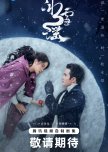
What I Liked:
--Vengo Gao-He was tailor made for the role of a suave, badass vampire.
--Gothic vibes-the dark exteriors and interiors were perfect for this story.
--Costumes-I loved all the velvet, especially Jing Xue’s wardrobe.
--Eternally winter-a great vampire setting. You never see vampires sipping Mai Thais on the beach. The Snowpiercer train ride through the frozen landscape also felt other-worldly.
--Ever present Snowman- I had hoped Frosty would have transformed into a snow monster but we can't have everything.
--Gold Crow-I’m a fan of the Corvus genus of birds though this avian actor was forgotten about much of the time.
--Non-romantic relationship for most of the drama-Based on Mi Lan’s childlike personality, there was definitely a maturity gap and vastly unequal power structure between her and Zhi Heng. Lovers don’t usually tell the other to “drink your milk.”
Neutral:
--CGI-Not great, but not a deal breaker for me
--Ending-spoilery comments after review
--The writers couldn’t use the word “vampire” or show them drinking blood but angry, biting, hair-pulling sex was all right. Mmmm…kay
What I didn’t like
--Zhi Heng written to be utterly stupid and inept in the opening salvo. This brutal scene had him acting completely out of character. They needed a set-up for him and Mi Lan to meet and to show his mostly indestructibleness but man it made him look less than powerful or intelligent.
--Anything that hinted at a romantic relationship. I don’t mind age gaps, but this was a maturity gap. Mi Lan was treated like a 12-year-old and acted like one for much of the drama.
--Terrible wigs-some of the wigs looked like roadkill.
--Both Liang and Situ weren’t written consistently and could give you whiplash with their back-and-forth emotions
--Liang’s plot armor-Zhi Heng could take on a jillion Shadow Warriors but somehow Liang always slipped through his fingers. Although he was always being beaten, shot, etc. Characters would also go into hiding and then come back into the open with no consequences.
--The magical stones element felt ill developed and clunky. Another demerit for censorship-it plays havoc with creativity.
--Wei Lian’s creepy walk on the dark side with Jing Xue
In conclusion:
❄Overall, I enjoyed this drama. It was a nice attempt at the vampire genre given all the restrictions and had a luxurious look. The costumes and settings may have been Republican Era but the drama felt more like a magical storybook which I quite liked. Far from perfect, yet also strangely addictive, Snowfall made for an interesting if fractured fairytale.❄
30 September 2024
Short spoiler below
*********
*********
*********
*********
*********
I didn’t mind the SE. It had been foreshadowed from the beginning. Since I didn’t care for any romance between the two main characters, I didn’t need the HE. The only thing I didn’t care for was the apparent deviation from the source material. Of the Republican Era and strictly historical dramas I’ve watched, the censors seem to prefer sad endings so I know going into these dramas the likelihood of the main couple living HEA is a low percentage. At least it didn’t come out of the blue and the story was headed in that direction from the beginning unlike other dramas where a disappointing ending is tacked on.
Considerați utilă această recenzie?
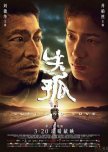
"If you search, fate grows. If you give up, fate dies"
In 2015 it was estimated 20,000 children in China had been stolen and trafficked just for that year. Some were sold for adoption, others for forced labor or prostitution. Lost and Love told the story based on a real-life father who had spent 15 years chasing down leads and searching for his child all over China. Andy Lau gave one of his best performances as the determined father who would never stop in his quest to be reunited with his son.Lei Ze Kuan rides his motorcycle with flags displaying missing children’s faces as he chases down leads on his missing son. After a road accident he meets Zeng Shuai when the young man fixes his bike. It turns out that Shuai was a kidnapped child and “adopted” by the family he lives with. The family has been good to him, but because of his unknown status he cannot go to university, marry, ride the train, or any other thing which requires an id card. He asks Lei to take a side trip and go with him to check on clues as to where his family might be. The two men bond during their road trip seeking the truth they both desperately want.
I’ve watched many films with Andy Lau, but Lost and Love is the first one where I wasn’t constantly reminded by his acting that he was “Andy Lau.” He gave a vulnerable performance as a father who was ridden with guilt and anguished over his loss. This understated interpretation was quite moving. Jing Bo Ran also gave a realistic performance as a lost son torn between wanting to find his biological parents and not wanting to betray his adoptive parents. The chemistry between the two quickly evolved into a surrogate family as they traversed the country. As they grew closer there were several tender and playful moments between them.
Peng San Yuan based the story on real life father, Guo Gang Tang. She added another missing child whose story with Sandra Ng as a trafficker was woven throughout the film, though it did turn melodramatic. Peng illustrated the complicated feelings and responses parents had who lived through the nightmare of having a child stolen from them. Aside from the guilt and fear, the trauma caused marriages to dissolve, mental health to collapse, and for some parents, the despair drove them to suicide. Peng not only wrote the screenplay but also directed the film. The pacing and transitions kept the film flowing even with three stories being told. The film was visually appealing as Peng highlighted the stunning verdant scenery of the countryside and architectural beauty of old chain bridges.
Lost and Love was heartwarming and heartbreaking and did so without falling into the trap of sentimentality. There were a couple of coincidences that were a bit too on the nose, but I’m a sucker for these stories based on real life events and was able to overlook them. I cannot imagine the terror of not knowing if your child was safe and whether you’d ever see them again. I also cannot imagine having the strength to spend every day for nearly two decades following any hint that might bring me closer to that child and dealing with the soul crushing despair every time a lead did not pan out. Lost and Love brought a horrifically painful subject to light while also showing the supportive networks and people trying to reunite families.
If you’d like to see how the real-life father’s story was resolved, see below.
28 August 2024
*****************************************************************
After TWENTY-FOUR years, Guo was reunited with his son!!!
This link still works as of this writing:
https://www.bbc.com/news/world-asia-china-57815491
Considerați utilă această recenzie?
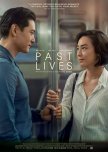
"If you leave something behind, you gain something, too"
Writer/Director Celine Song brought out the Kdrama tropes in her directorial film debut Past Lives. She took such tropes as childhood connection (destiny!), lovestruck second male lead, and the much-maligned love triangle and used them in fresh ways. The film I was expecting and the film that played out before me were quite different.Na Young and Hae Sung are best buddies at the age of twelve. Then her family emigrates to Canada separating the two children. Twelve years later Na Young, now called Nora, looks up old friends on a lark, including Hae Sung. The two reconnect via computer and begin conversing. Hae Sung wants her to come to Korea for a visit and she wants him to come to New York City where she lives. Feeling at an impasse in her life she goes on a break from Hae Sung. Twelve years later, now at the age of 36, Hae Sung comes to NYC to visit the married Na Young.
I dreaded Nora’s husband, Arthur, being portrayed as the rich, abusive or disinterested white guy standing in the way of the sacred childhood connection. I laughed when Arthur said their situation would make a great story, “I would be the evil white American husband standing in the way of destiny. I’m the guy you leave when your ex-lover comes to take you away.” In reality, Arthur was a loving, generous husband, who was learning Korean to better connect with his wife. He didn’t throw a jealous hissy fit when Hae Sung came to town. He respected Nora enough to let her do what she needed to.
Hae Sung arrived in town, obviously still in love with Na Young. Or was he only in love with the idealized version of her? He hadn’t spent any time with her since she was a child. He still lived with his parents and considered himself too ordinary. Despite working, he hadn’t made enough money to marry and had recently broken up with his longtime girlfriend. It didn’t help that handsome Yoo Teo looked his age (42) and not 36 which further made me wonder about his hesitancy with life choices.
The star of the film was Na Young/Nora. She had always had dreams and goals and was highly competitive. She was a playwright and working out her own destiny. The choices she’d made weren’t easy but she knew where she wanted to go and what she wanted to do. That didn’t mean she was cold and calculating. She’d loved Hae Sung as a child and maybe even as an adult. But she also loved her husband and was funny and affectionate with him. Nora made the choices that were right for her, no excuses, and actually seemed satisfied with her decisions. After making the painful decision to go on the break with Hae Sung she never showed any regret. That didn’t mean she didn’t miss him or Seoul, and maybe more importantly, who she was in Seoul. As an immigrant, she had two selves, and both were authentic and important. Hae Sung helped her remember the little girl from Seoul she’d left behind.
Greta Lee gave a lovely nuanced performance as Na Young/Nora. Without tears and histrionics, she delicately showed her character working through where she wanted to be, who she wanted to be with, and more importantly---who she wanted to be. Joe Magara made Arthur a sympathetic three-dimensional character subtly playing out a variety of emotions. Yoo Teo brought a vulnerability to Hae Sung as a man who had to take one last chance to see his childhood love.
This film was far less a love triangle and more one of Nora’s self-discovery and reconnecting with her past and ethnic identity. Many people have that “what could have been” someone in their life. But often that person is in the perfected past of memory and not the imperfect reality of the present. Past Lives gave us mature, honest adults coming to the realization of what doors needed to be closed, opened, and left slightly ajar.
25 August 2024
*********************spoiler******************
Dude, 24 years? That is why you ended up the second lead. Luck and love favor the bold!
Considerați utilă această recenzie?
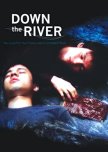
"Let go so you will be happy"
Down the River told the melancholic story of first love through the eyes of Krit, an openly gay high school student. This film was Director Nuchy Anucha Boonyawatana’s graduate school effort so I was lenient in my rating and criticism of it. The story was heavy with Buddhist and natural symbolism interwoven with the boys’ decisions about their futures and whether they would be together or apart.Krit is convinced that if he gives offerings and prayers at nine different temples that his wish to be with Win forever will be granted. The two have bonded since childhood and their friendship has crossed over into something more intimate. Win is going to the academy in order to join the military which would end any type of relationship they might have. Win also refuses to believe he is gay despite their friendship blurring lines with being lovers. He has a girlfriend and knows the military and society will not be accepting of him as a gay man. Krit presses flowers and his memories of Win into a book that he keeps with him that becomes a symbol of his love. On the trip to the temple and hike to the Elephant Waterfall, the seventh of the falls, Krit hopes to convince Win to stay, but to his dismay Win invites two girls to go with them. Further dimming Krit’s hopes are the monk at the temple telling him at the beginning of the trip that in order to be happy he has to let go.
Nuchy filmed numerous scenes of water and the woods set to a score that perfectly matched the mood and natural background. Sadly, several scenes were too dark to see much of anything. I don’t know if that was by design, age, or poor equipment. The film was held back between the dark scenes and rudimentary acting. While Krit came across as more fully developed, Win was a bit of an enigma. Despite the more amateur issues, I enjoyed the film especially as the meaning of the title became clear.
Krit reminisced about his relationship with Win in an almost spiritually poetic manner. While the film had a universal theme of first love, it also showed how first love between members of the same sex faced even more hurdles in a time and place where their love wouldn’t be accepted. Sometimes a person can hold onto their first love and other times they have to let it go to the river of time.
12 August 2024
Considerați utilă această recenzie?

"I don't have time to get mad anymore"
Filipina director Mae Cruz Alviar and writer Enrico Santos put their own stamp on the relationship time travel trope. They didn’t break new ground but they did commit to their story and characters in a way that came across as authentic.Mary and John have been married for years and have a son together. Mary still deeply loves John and has built her world around helping him to fly while John has become selfish and angry. John never has time for her or their son, Austin, especially after Austin failed to make the football team. Austin tells his dad that Lodz has been talking with him and that everything is going to work out, his dad just has to figure out what he really wants. John asks who Lodz is and Austin shows him a picture of Jesus. When Mary dies the next day, John has his own meeting with Lodz who has a proposition for the guilt-ridden man.
John had a little over a day to put things right and save Mary. Not really long enough to have a complete personality change and to its credit the film showed John faltering at his first challenge. He was smacked upside his head with what was really of value in his life and how much time he’d wasted thinking only of work and himself. The people around him had suffered and been starved of his affection and attention. Mary was a skilled chef and she wanted to fly. Austin was a gifted pianist ready to fly if given the chance as well. John’s eyes were opened to the love and happiness he’d been shutting out for years and how badly he’d hurt his family.
Few people are given second chances and John learned about redemption, accountability, and regret in a crash course delivered by an electrician to help him see the light. Normally, this is the type of film I’d give a 7.5 to for being a good average movie, but I bumped it up for the commitment the filmmakers showed until the end to not take the easy way out.
11 August 2024
Considerați utilă această recenzie?
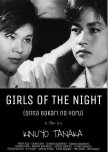
Mrs. Nogami, the headmistress of the Shiragiku Dormitory finds Kuniko work as a live-in worker at a shop. No one there knows what Kuniko used to do for a living. Her boss works her from morning until night and after her living allowance is subtracted from her wages Kuniko will only be making 10, 000 yen/68 USD a year. After her past is revealed, the shopkeeper is determined to demean and replace Kuniko. Rather than be humiliated and taken advantage of, Kuniko takes the situation literally into her own hands. At her next job in a factory, Kuniko tries another tactic and reveals her past to the women in the dormitory. Instead of being supportive her female co-workers violated Kuniko in a disturbingly violent scene. At her third job she finds love, but also runs into the limitations of societal forgiveness and acceptance.
Girls of the Night was one of the few films from this time that was both directed and written by women. Tanaka Kinuyo filmed a fairly progressive film given the timing of the new law. Far from condemning the ex-prostitutes, the film tried to show that the majority of the women sold their bodies due to tragic situations pressuring them from society, family, or personal relationships. Mrs. Nogami time and again supported Kuniko and the other women in her care. When Kuniko asked why it had been okay for her to use her body as she wished before and now it was illegal, Mrs. Nogami had no good answer for her. Girls of the Night also had a lesbian character in a small supporting role, the first I’ve run across in this era. Whether due to the source material or concerns of how the audience would receive the film, they did hedge their bets by having Kuniko be harshly critical of her own past actions and decisions.
The pure and polite society Kuniko interacted with might not have had to sell their bodies to make a living but they also showed they were far from the moral ideal. Kuniko had more than her share of encounters with vile humans but she also found healing in the people who accepted her. The most important person she had to convince that her past could be forgiven was herself. Tanaka’s 5th film in the director’s chair once again showed Mizoguchi Kenji was wrong and that she was quite smart enough to direct a film.
10 August 2024
Considerați utilă această recenzie?
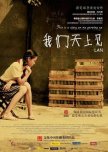
During the 1960’s at the age of three, Jiang Xiao Lan’s parents were sent to the “countryside”. Her 89-year-old grandfather was left in charge of her. Initially enforcing his authority with a ruler style whacking stick, the neighbors convinced him to use his words instead. At school Xiao Lan was ridiculed and taunted mercilessly as a “bastard of counter revolutionaries.” Grandpa wanted Xiao Lan to have a skill so that when she grew up she would not be sent to “the countryside.” She joined gymnastics but was never accepted and always considered an amateur. Lan missed the parents she scarcely knew. The only connection she had to them were their letters that Grandpa read to her. After a time jump, not much changed for Xiao Lan as she entered adolescence.
Lan was beautifully shot as if each scene was a painting, featuring both photogenic actresses who played Lan. Most of the scenes contained either rain or snow with Lan carrying her ubiquitous umbrella. Lovely music accompanied Xiao Lan’s growth from small child to teenager. Zhu Xu as Grandpa Tang gave a tender performance as the man who cared for and tried to shield Xiao Lan from the harsh realities of her life. Yao Jun and Zhu Yinuo seamlessly portrayed the melancholy Xiao Lan who desperately wanted to fit in somewhere and longed for her missing parents. Director Jiang created several whimsical scenes such as Xiao Lan flying across the Huai River with her umbrella to the north to find her parents. There were also several references to missing teeth, the meaning of which eluded me.
Jiang Wen Li composed a touching film showing the consequences of the cultural revolution on families. The relationship between Grandpa Tang and Xiao Lan came across as loving and realistic. While it was beautiful to look at it, I kept waiting for some sort of emotional climax which never came. I enjoyed Lan and maybe on a different day would have rated this graceful film higher.
9 August 2024
(7.75)
Considerați utilă această recenzie?

 54
54 191
191 11
11






















